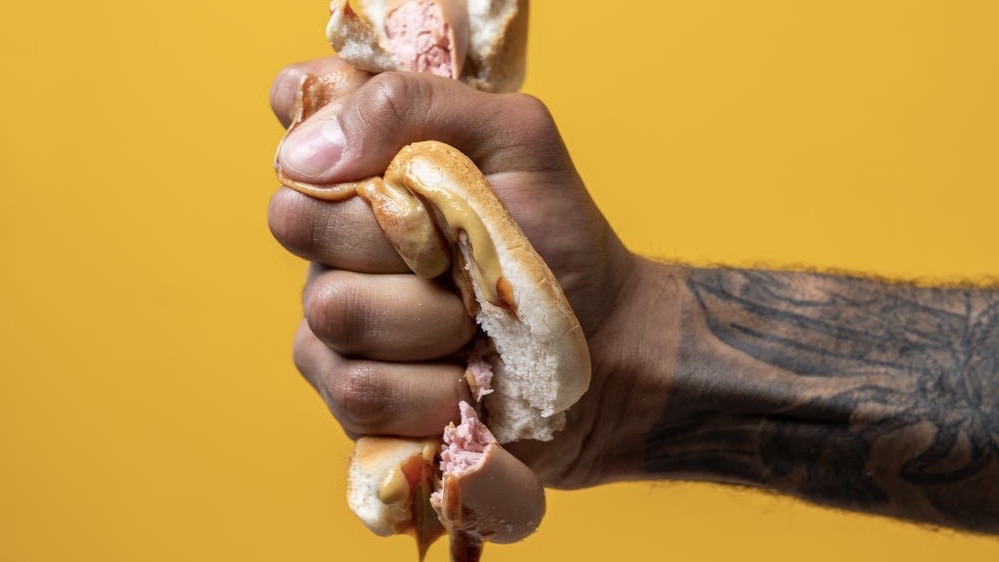Recently, Boris Johnson announced a national crackdown on obesity by banning the junk food adverts and in-store promotions with his “Better Health” campaign after he got struck down with coronavirus in April. Is it another “using a sticking plaster on a severed limb” strategy, or will it really tackle the obesity epidemic?
Tracey Fernandez and her two kids all gained weight during the lockdown, while as a single mother, she still found stressful feeding her two children during the coronavirus pandemic.
Every Thursday, Tracey will put her marks on and walk around 15 minutes to the Cardiff Woodville Christian Centre, a food bank centre in The Trussell Trust network, to pick up her food parcel. The food parcel she got including cereal, tinned meat and vegetables, biscuits, fruit juice and other food with relatively high salt and sugar.
Although Tracey felt incredibly grateful for the generous help the food bank provided, she also admitted that the food she received is more likely to be unhealthy for her kids. “Before the pandemic, I always cooked myself and try to feed my kids with healthy and nutritious food. But since using food banks, those non-perishable tinned and dried foods have become a daily part of our life. Plus, we all have to follow the lockdown policies, I don’t think we can lead a healthy lifestyle anymore,” says Tracey.

The needs of Tracey and her children and those of millions of families struggling financially are less likely to eat healthily because the foods that are the cheapest are not usually the healthiest. The research relating to food cost, published in the Journal PLOS One, compared the price of 94 kinds of foods and drinks from 2002 to 2012. It found out that healthy food in 2012 was three times more expensive per calorie than less healthy food. “When you are poor, you only have limited choices to eat healthily. It may blow my whole week’s pay on the nutritious salad,” says Tracey.
According to Environmental Research and Public Health, adolescents in the UK face malnourished in a new way– obesity. And the low income is always in connection with being overweight, rather than hunger in recent decades. “You might think that obesity associated with wealthy families, but actually the majority of people who are overweight or obese live in low- and middle-income families,” says Meera Sheka, the global lead for nutrition with the World Band’s Health.

When talked about the primary cause of obesity in the UK, Meera believes financial poverty and time poverty are two main factors. She says, “When more women have to go out to make a living, which is a great thing, but it also means there is less time to cook food from scratch. So, parents are more likely choosing fast food for kids to save time. Besides, those fast food are easier to access and more financially available for most low-income families.”
According to the statistics issued by Public Health England, nearly two-thirds of adults (63%) in England were classed as being overweight or obese in 2015. 38% of people are obese in the UK’s lowest-income family compared with 20% in the least deprived family. “Obesity should be back to the agenda. Some years ago, people didn’t even think about obesity or overweight as an issue. But we’ve seen over the last few decades obesity rates have gone up at least three times,” says Meera.
Obesity is back on the government agenda. After the prime minister got struck down with Coronavirus in April, he announced a national crackdown on obesity. From the figures of Public Health England, clinically obese people are 40% more likely to die of COVID-19.
Moreover, according to the World Health Organization research, obesity is linked very closely to some non-communicable diseases– cardiovascular diseases, cancers, diabetes, and so on. “All of which means higher healthcare costs, higher absenteeism from work, which leads to lower productivity. And of course, all of that adds up to lower national productivity as well,” Meera explains what are the issues that economies face when the obese rate rising.
Although the prime minister launched the official obesity campaign and a government crackdown on obesity will take effect soon, some experts still criticized the new plan. Tim Spector, the researchers of microbiome nutrition and diet at King’s College London, believes if the government ignored the real causes and major factors of obesity, the national crackdown on obesity will like using a sticking plaster on a severed limb. He says to The Guardian that Boris Johnson’s plan to ban buy-one-get-one-free deals and junk food adverts before the watershed and legislate for calorie counts in restaurants is actually deluding the public. Boris was even reluctant to extend the sugar tax to other sweet products and processed food due to the lobbying of the rich and powerful food companies, which aren’t going to disappear any time soon. Therefore, it’s easier to blame advertisers than to face real trouble.

Professor Tim believed the real trouble behind obesity is the lack of food education. He said food education should be a compulsory subject, and parents should introduce a much more comprehensive range of healthy foods to their kids. Teachers at school should teach students planting and cooking food and knowing the knowledge of nutrition and health. Students should have the ability to prepare a healthy meal with simple ingredients to form a healthy eating habit.
However, developing healthy eating habits seems to be a challenging task. According to BEAT, the UK’s biggest eating disorder charity, there are between 1.25 million people in the UK affected by an eating disorder, and the pandemic makes the situation even worse. “An eating disorder is when you have an unhealthy attitude towards food and experience severe disturbances in eating behaviours and related emotions. What is going to kill you is not the disease itself, but the associated mental issues, such as depression or anorexia,” says a spokesman from BEAT.
According to this charity organization, more eating disorders develop during adolescence and most commonly affect young women aged 13 to 17. Virgie Tovar, the activist and expert on weight-based discrimination and body image, used to experience the eating disorder when she was young. “For two decades, I restricted my diet strictly in order to lose weight. I disliked my body and be very concerned about what other people think of me. When I finally stopped dieting for good nine years ago and try to recover from an eating disorder, I found out I got more energy and concertation to focus on my work and interest rather than how many calories I take,” says Virgie, who opposed dieting to lose weight.
Virgie thinks dieting makes people more obsessed with food and increases stress hormones, which will ruin people’s lives. Therefore, to help people fight against eating disorders and develop healthy eating habits, Virgie created an online body-positive campaign called “Lose Hate Not Weight”. This campaign focuses on helping people viewing their weight and figures correctly and having a positive eating attitude. People of different sizes participate in this online campaign by uploading the food they cooked and sharing the ingredients and unique recipes they made to encourage them to eat healthier. This campaign has been tagged 140,000 times on Instagram and inspired many people to quit the unhealthy eating habit.
Besides the online campaign, Virgie also held an off-line course called “Camp Thunder Thighs”, which provided a full weekend of workshops and activities to share Virgie’s experiences of overcoming food disorder and teach people how to break up with diet culture and love their own body. Virgie held this three-day-course in a national park with a beach, mountains and nature trails nearby to let participants be immersed in a comfortable and relaxed environment. People who attended camp will join in workshops sharing their struggles with food and discussing their confusion about body image and fat discrimination.

“I always believe those off-line catch-ups could provide people with eating issues a safe space to speak out their worries, understand their personal issues and give them a different perspective to rethink their body and self-esteem to rebuild their relationship with food,” says Virgie.
Besides, to build a balanced relationship with food, there are still many people eager to know how to lose weight healthily. The Genetic epidemiologist Tim Spector, also the writer of The Diet Myth, provides advice for his readers. First of all, back to the kitchen, buy fresh ingredients and choose healthy food. Secondly, eat fermented food like yogurt, Kefir, fibre-rich food includes legume, vegetables, fruits and nuts to balance diets. Lastly, chew more slowly to control the appetite.
The UK government still has a long way to go to help beat Britain’s waistline and provide essential food education for millions of low-income families who struggle with food and health.
